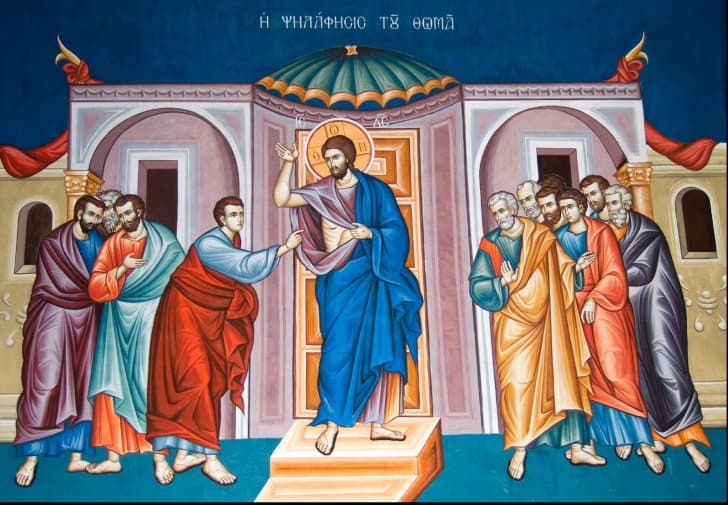We see in the Gospel that obedience is defined as a source of grace, as a source of peace in our hearts. Thomas lives what we all live, hears and does not believe, and then sees Christ and seems not to believe. Only when the dialogue with Christ begins, Thomas’s doubt is overcome, and Thomas becomes a theologian in the sense of a God-seeing God speaking God.
 St. Gregory Palamas warns us that, as a rule, if we look at the Eleventh Appearances of Christ after His Resurrection, in most situations Christ shows His Apostles, gathered together. From this we understand that only in our struggle to spiritually join us, to belong to a spiritual family, we are also likely to receive, like the Apostles, the peace that Christ brings. The Holy Theophilus of Bulgaria even interprets and says that Thomas, doubtful being in the heart of faith, did not pretend to be present when Christ came in their midst. And it shows how important it is to have a common sense. And the civic consciousness is in the family – if the family decides to go on holiday, basically, some people go, if the family decides to buy a house, the whole family is heading for this effort, to this challenge. That is why in monasteries and parishes everything is built around a confessor, who gives a line. The moment I go into disharmony with my father and my brothers, I exclude myself and make myself like Thomas. And whenever God wants me to confirm from the beliefs, I will be bent (but is that right?). This is why Toma’s lesson is important, because he calls us to this unity.
St. Gregory Palamas warns us that, as a rule, if we look at the Eleventh Appearances of Christ after His Resurrection, in most situations Christ shows His Apostles, gathered together. From this we understand that only in our struggle to spiritually join us, to belong to a spiritual family, we are also likely to receive, like the Apostles, the peace that Christ brings. The Holy Theophilus of Bulgaria even interprets and says that Thomas, doubtful being in the heart of faith, did not pretend to be present when Christ came in their midst. And it shows how important it is to have a common sense. And the civic consciousness is in the family – if the family decides to go on holiday, basically, some people go, if the family decides to buy a house, the whole family is heading for this effort, to this challenge. That is why in monasteries and parishes everything is built around a confessor, who gives a line. The moment I go into disharmony with my father and my brothers, I exclude myself and make myself like Thomas. And whenever God wants me to confirm from the beliefs, I will be bent (but is that right?). This is why Toma’s lesson is important, because he calls us to this unity.
When Toma joins again he may receive the rebuke, but also the teachings of those who were present. Then it is worthy, after a week, to see the Risen Christ. And Saint Theophilactus says that this week is for Thomas a repentance of repentance, a respite of training, a moment of humiliation. You realize that it was not easy at this time when he tried to persuade the other ten that Jesus could not rise, and they were telling him that this is precisely their experience. Finally, Thomas is humiliated and made compatible with them, with his brethren, rejoining the spirit of unity, and meeting with Christ.
This is important because we see in the Gospel that obedience is defined as a source of grace, as a source of peace in our hearts. Thomas lives what we all live, hears and does not believe, and then sees Christ and seems not to believe. Only when the dialogue with Christ begins, Thomas’s doubt is overcome, and Thomas becomes theologian-in the sense of God-seeing God-speaker-synthesizing so well that he believes that the two human beings, “My Lord” and Divine “My God” are one in the Person of the Risen Christ.
